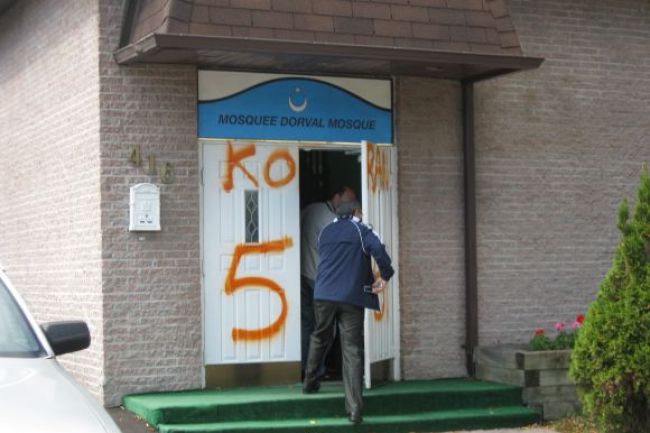 This coming Sunday’s Eid holiday marks the end of Ramadan, the Muslim fasting month, but the occasion was marred for Dorval Mosque’s congregation by a fourth act of graffiti vandalism within 14 months.
This coming Sunday’s Eid holiday marks the end of Ramadan, the Muslim fasting month, but the occasion was marred for Dorval Mosque’s congregation by a fourth act of graffiti vandalism within 14 months.
“What’s wrong with them?” Mehmet Deger, president of the mosque, asked of the perpetrators. “If they want to send us a message, they should come and talk to us,” he said.
Members filed in to listen to Friday afternoon prayer sessions today, walking through the mosque’s white wooden doors like every other week. This time, however, the latter were marked by the words “Koran 5 51,” painted in large, orange letters.
As in the case of previously scrawled graffiti in May and February 2009 and July 2008, the numbers are in reference to a controversial verse in the Muslim holy book. “Don’t take Jews and Christians as your friends,” Deger said the verse approximately translates to in English.
However, he said context is needed to fully understand what is meant by the line.
According to today’s Imam running the prayer sessions, Dr. Ahmad Shafaat, the Arabic word for friend in this case—awliya—should be taken to mean “allies” and not “friends” in the social sense. When the Qur’an was written, it was in a time of war, Shafaat reminded, and this is why it recommended to not form alliances with Jews and Christians. “So don’t make allies. Allah does not prohibit you dealing nicely, kindly, lovingly and justly with those who do not fight with you on your religion and do not throw you out of your houses and so on and so forth,” Shafaat said.
After every attack, the mosque issued an invitation to the perpetrators to come forward for a debate or a discussion about their views on Islam, to no avail. “This is the fourth time that we have invited them,” Shafaat said to the congregation during a brief speech between prayer sessions today. “Oh men of graffiti,” he asked,” do you think you are men of peace?”
For members, the painted message, which was already being washed off with soap and water by the end of the prayer sessions, seemed to imply ignorance on the religion. “I’m Muslim and I’m Moroccan,” explained Sana Belmehdi. “And there are a lot of Moroccans that are Jewish. In fact, I have Christian and Jewish friends. I have plenty of them,” she added.
She said she did not attach much significance to the date of the incident. “I don’t think the timing has all that much importance,” she said.
Eddie Rahmadjo emerged out of the prayer sessions looking disenchanted about the whole affair. “There is a lack of communication between Muslims and others,” he said. “We need to talk to each other.”
Even as lingering traces of the previous graffiti remain on the mosque’s side wall, Deger has seen to it that the institution is better-prepared to deal with attacks. Instead of one, there are six cameras now surrounding the building, their live feed appearing in monitors in his office. “We haven’t seen the footage yet,” Deger said earlier today. “The security man is supposed to come and look at it.”
In May, the mosque was only armed with a single external camera. Deger said the footage on it did not amount to much as it was too blurry to make anything out precisely, with the camera lens covered by spider webs. “Even this time, maybe they were wearing hoods,” he said.
While the mosque has alerted local police about each of the incidents save for the one in February, no suspects have turned up so far. “There’s a sergeant-detective,” Deger said. “She came here and she took notes. She did what she’s supposed to do, but she did not get any results yet.”
In June, Station 5 community relations officer Liliana Bellucci told The Chronicle it was pulling its operation. “An investigation is not recommended because we don’t have enough evidence to accuse anybody,” she said at the time.
However, she mentioned the situation could change if new evidence were to be found.
Dorval Mayor Edgar Rouleau condemned the graffiti attacks, calling them “disgusting.” However, though he said the city’s public security officers could be asked to patrol grounds around the mosque and other religious institutions more often, that would not necessarily guarantee safety. “(The perpetrators) know the system,” Rouleau said. “They wait for the security to go by, and they wait for the police to go by, and they make their mess,” he added.
Rouleau also defended the police. “It’s not as easy as it looks (to catch these people),” he said. Just because it appears obvious that the same individuals are behind the four attacks, he added, does not mean they can be caught easily. “I’m going to call the mosque today or tomorrow,” Rouleau said, “tell them I’ll do whatever I can to help them.”
